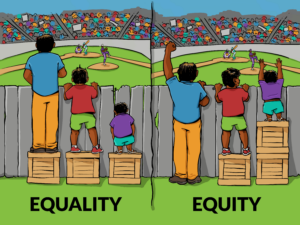Diversity, Equity, and Inclusion
Worth Repeating: AAUW’s Diversity Statement
United We Stand
In principle and in practice, AAUW values and seeks an inclusive membership, workforce, leadership team and board of directors. There shall be no barriers to full participation in this organization on the basis of age, disability, ethnicity, gender, gender identity, geographical location, national origin, race, religious beliefs, sexual orientation or socioeconomic status.
Adopted by the AAUW Board of Directors, June 1988; revised October 1988, October 1992, February 1993, June 1994, June 2000, January 2005, July 2009, July 2011, April 2016, April 2017, June 2018
Illustration courtesy of “Interaction Institute for Social Change | Artist: Angus Maguire.” See interactioninstitute.org and madewithangus.com.
MULTICULTURAL WINTER HOLIDAY SEASON!
In our multicultural society, there are many traditions and celebrations which enrich our lives and teach us about history, religion, and cultural diversity. The following is a description of a variety of winter holidays celebrated in this country that can showcase at AAUW parties and events.
Bodhi Day is a Buddhist holiday commemorating the day Buddha experienced enlightenment. It is celebrated on December 8th.
Chinese New Year is based on the lunar calendar and the date of celebration shifts from January to February. Each year features one of the 12 zodiac animals.
Christmas is the commemoration of the birth of Jesus, the Christian messiah. It is celebrated on December 25th (Protestants and Catholics), January 6th (Armenian Orthodox), or January 7th (Eastern Orthodox).
Diwali is a five-day celebration by Hindus around the world during the lunar months of Ashvina and Karttika (October–November).
Epiphany is celebrated 12 days after Christmas, marking the end of the
Christmas season. Christians believe that this was when the three kings visited baby Jesus, the Christian messiah.
Hanukkah is celebrated for eight days each November or December. Jews
celebrate an ancient miracle in which one day’s worth of oil burned for eight days in the Holy Temple in Jerusalem. The menorah holds eight candles and prayers are recited with the nightly lighting.
Kwanzaa, which means “First Fruits,” is a celebration of African culture based on ancient African harvest festivals. It is celebrated by millions of African Americans and Pan-Africans of all religions from December 26th to January 1st.
Las Posadas, symbolized by the poinsettia is a nine-day festival celebrated in Mexico, Central America, and parts of the United States. The holiday starts on December 16th and lasts until Christmas Eve.
Makar Sankranti (Maghi), the Hindu celebration of the harvest, is celebrated on January 14th.
New Year’s Eve/Day is a worldwide celebratory observance of the end of one calendar year and the beginning of the next.
Soyal, celebrated by the Hopi Indians in the Southwest United States, falls on the shortest day of the year. Participants ceremonially bring the sun back from its long slumber.
Winter Solstice (Yule) occurs on the shortest day of the year, usually around December 21st. People all over the world light bonfires and candles to coax back the sun.
The strength of our diversity as a nation becomes beautifully apparent during the holiday season in so many wonderful ways.

